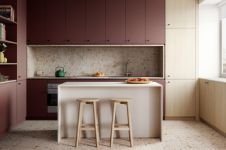ex GST and Shipping

Minimising Waste, Maximising Efficiency: An innovative new timber-recycling initiative is the latest in a series of sustainability measures at Laminex’s Toolara MDF plant.
As Laminex has expanded its manufacturing operations in Queensland, we’ve retained a strong focus on the sustainability of our production processes. This is highlighted by our partnership with Hyne Timber, which supplies plantation pine woodchips to our MDF plant at Toolara, 30 kilometres north of Gympie.
The plant’s full-year production is around 330,000m3 of MDF, requiring 500,000 tonnes of wood, half of which currently comes from Hyne. The woodchips are made from the parts of logs left over from Hyne’s production of structural timber products, under their wastage-minimising “whole of log” approach to forestry. For Laminex, receiving timber as chips rather than larger pieces reduces the amount of time and energy required for our production process.
But we're now taking this a step further, through a recycling initiative that reduces wastage after our MDF has gone to market.
Laminex General Manager Operations Graham Andrew explains. “We knew that the MDF off-cuts produced by our customers were typically going into landfill,” he says, “so we’ve implemented a recycling program where these off-cuts are fed back into our production process, as fuel for our heat plants.” As a result, less material is going to landfill and fewer natural resources are being consumed in the manufacture of our MDF.
These recycling initiatives come on the back of a number of investments in energy efficiency already made at Toolara, including the installation of LED lighting throughout the site and the deployment of new variable frequency drive air compressors. “We replaced 30-year-old equipment that was very energy intensive with brand new, state-of-the-art equipment under the sustainability project,” says Andrew. “It’s saved us several thousands of dollars and several thousands of kilowatts.”
Looking to the future.
Laminex is running a feasibility study for a co-generation plant fuelled by biomass – specifically, branches and other parts of plantation pines that typically remain on the forest floor after harvest – which would dramatically reduce the Toolara plant’s electricity demand from the grid. The ambition is for the project to be up and running by late 2022 or early 2023. “The installation of a co-generation plant has a good payback because of electricity savings,” said Andrew. “It would reduce our carbon footprint substantially.”
So, between recycling, energy efficiency measures and co-generation, Laminex is working hard to continually improve the sustainability of its operations at Toolara. The net effect will be to reduce the environmental impact of the Laminex panel products the Toolara MDF is used for, in turn reducing the impact of construction and renovation projects right across the country.


